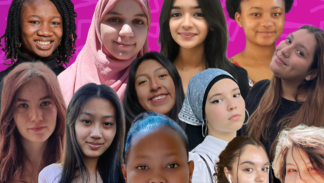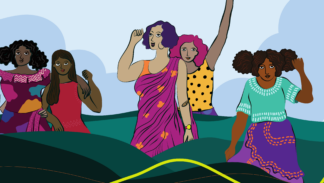News Update: Is Zika a tipping point in the fight for reproductive rights in Latin America?
Much has changed since the Zika virus was declared a global public health emergency by the World Health Organization earlier this month. The WHO alert came as the infection was linked to more than 4,000 reported cases of microcephaly—a birth defect which causes babies to be born with abnormally small heads and brain damage—in Brazil since October. While scientists work to determine the precise connection between the Zika virus and microcephaly, as well as other mental illness risks according to the latest warnings from health experts, the outbreak has kindled a critical conversation about reproductive health in the more than 25 countries and territories in the Americas where Zika infections have spiked.
Exposing the health care reality for women and girls
Recommendations by government officials in Brazil, Colombia, Ecuador, and El Salvador for women to “avoid getting pregnant” only exposes the stark reality for many women and girls in Latin America, especially in rural areas. Most have minimal access to sexual and reproductive health and rights or education. Across Latin America and the Caribbean, for instance, WHO estimates that 22 percent of women want to delay or prevent pregnancy but do not have access to birth control. There are high levels of misinformation—for instance, most women and girls are not educated about contraception or family planning due to strong conservative rhetoric.
Women’s groups are mobilizing to fill the gap in sex education throughout the region, teaching women and girls about their sexual and reproductive health and rights, and helping them access contraceptives. They also help women to navigate the complex abortion laws and exceptions, as well as find physicians that provide reliable care and honest advice.
With the outbreak of the Zika virus affecting more women across the region every day, Global Fund for Women is working closely with our grantee partners in Latin America who are leading the movement for sexual and reproductive health and rights. We spoke with our networks of women’s groups and activists in Brazil, Colombia, and Argentina to find out the unique needs of women and girls, and the critical role the women’s movement is playing not only to mitigate the health crisis but to turn it into a key moment in the fight for gender equality.
What women are experiencing in Latin America
“Pregnant women across Brazil are now in a panic,” Silvia Camurça, director of Global Fund for Women grantee partner SOS Corpo Instituto Feminista para a Democracia told the New York Times earlier this month. SOS Corpo is one of the leading women’s groups driving a national movement for sexual and reproductive health and rights in Brazil. The group has deep roots in Recife, the northeastern Brazilian city hit hardest by the increase in microcephaly, having been established there in 1981.
In Recife, physicians report seeing 10 times more babies with microcephaly than normal in the past six months. In addition to known birth defects, babies with microcephaly also require increased medical attention, as the condition can involve seizures, delayed motor functions, speech issues, impaired cognitive development, dwarfism, and more.
This means significant financial strains. According to our partners, the brunt of this economic hardship is falling on women.
“Pregnant women who have or have had Zika are being abandoned by their partners, and also after the baby is born,” explains Jacqueline Pitanguy, a long-time activist in Brazil and former Global Fund for Women Board Chair who is currently advocating for abortion rights for women in light of the Zika virus outbreak. “The Bishop of São Paulo said women should take the care of babies with microcephaly as their mission—only her. The loneliness, the abandonment of these women, who are also poor and deprived of public health assistance, is absolutely dramatic.”
Indeed, the financial strains from the Zika virus begin immediately for women, as detection and diagnosis is also expensive. “To identify if you have had Zika, the cost in private labs is close to 1000 reais (just over 250 US Dollars],” says Pitanguy. “The majority of women cannot afford it.”
Although the link between the Zika virus and microcephaly has not yet been confirmed, it has incited understandable fears for women. Women’s groups are helping pregnant women understand the potential link, connecting them with doctors, and educating them about what a Zika virus diagnosis could mean.
“Science cannot diagnose microcephaly in the first months of pregnancy,” explains Maria José Rosado, the president of longtime Global Fund for Women grantee partner Catholics for the Right to Decide in Brazil, part of a network which has been working on the issue of sexual and reproductive health and rights in Latin America for nearly 30 years. “This is the harrowing drama that has terrified pregnant Brazilian women.”
It’s true: the diagnosis of microcephaly, according to the U.S. Centers for Disease Control, is most accurate during pregnancy only through an ultrasound late in the second trimester or early in the third trimester—meaning around five or six months into a pregnancy.
Beyond Brazil, in places like Colombia, our grantee partners are facing a unique situation: the Zika virus and other mosquito-borne illnesses have been present there for quite some time, and there hasn’t been a similar spike in microcephaly. “It’s difficult because we have been living with Zika and Chikunguya [another mosquito-borne virus] for a long time and in general there has not been a great deal of issues,” explained Elena Rey-Maquieria Palmer, Executive Director of Fondo Lunaria Mujer, about the current situation in Colombia. “Since the beginning of the year and more since the WHO made the international announcement, the government is making public statements about it. The national government has made some recommendations about avoiding to get pregnant until June 2016, and to use repellent and mosquito nets.”
A tipping point in the decades-long fight for safe and legal abortion
While governments throughout Latin America are advising women to avoid pregnancy, the reality is that many women cannot exercise this right due to high levels of gender-based violence and lack of access to contraception.
“Most Latin American governments who have been dealing with the Zika outbreak have been trying to put all of the obligation, all of the weight of the epidemic, on women,” explains Pilar Escalante of Socorristas en Red, a Global Fund for Women grantee partner in Argentina that has been leading the movement for sexual and reproductive health and rights there for years. “In Latin America, more than half of the pregnancies are unwanted. If we put the responsibility regarding the Zika outbreak on women who are not getting enough sexual education, who are not getting the proper access to birth control, who do not have the ability to make decisions about our own bodies—it’s just not reasonable.”
UN Commissioner for Human Rights, Zeid Ra’ad Al Hussein, recognized this, saying, “The advice of some governments to women to delay getting pregnant ignores the reality that many women and girls simply cannot exercise control over whether, when, or under what circumstances they become pregnant, especially in an environment where sexual violence is so common.”
In support of Al Hussein’s position, Judge Coelho de Alcantara of Brazil went against the country’s ban on abortion by announcing he will allow women to end a pregnancy in cases of microcephaly, saying, “I know this is very difficult because the subject is new, requires thorough discussion, and a great deal of religious influences persists… But, my position is that abortion for microcephaly should be allowed.”
This carries significant weight in a country like Brazil, where abortions are allowed only in cases of rape or anencephaly (an extreme birth defect in which parts of the brain or skull are missing, causing almost all babies infected to die shortly after birth), or when the mother’s life is in danger. While Brazilians reportedly seek abortions at rates comparable to those in the United States, because of the law, thousands are forced to seek out unsafe illegal abortion—the fifth leading cause of death for women in Brazil today.
“All the [arguments] in favor of abortion that come from people in different sectors—such as judges, physicians, and journalists—have a major role because they take the issue out of the feminist circle which has always defended it and make our position stronger in the face of conservative sectors,” says Jacqueline Pitanguy, who wrote one of the first opinion pieces in Brazil to advocate for changes to the country’s abortion laws in light of the Zika virus outbreak.
This shifting dialogue—and the fact that many actors are speaking out in favor of abortion for the first time ever—could mean a critical tipping point in the long fight for sexual and reproductive health and rights in Latin America.
The Zika conversation “triggers an urgent debate on contraception, abortion, gender inequalities, and women’s rights,” says KK Verdade, Executive Director of Global Fund for Women grantee partner, ELAS Fund—the only women’s funds in Brazil. “We believe it’s an important moment to discuss health policies within another logic, respecting sexual and reproductive autonomy, and talking about the social and political consequences of a law that gives women no options for interrupting a pregnancy.”
“Sexual and reproductive rights for all women, poor and rich, must be taken seriously,” Debora Diniz wrote in a powerful opinion piece published in the New York Times. Diniz is the founder of Anis—Institute of Bioethics in Brazil, one of the groups supported by the ELAS Fund. “The government should immediately offer comprehensive sexual and reproductive health care to all Brazilian women, with a specific focus on those at most risk of Zika infection.”
Women’s groups like ELAS Fund and the organizations it supports, are highlighting the crisis to show policymakers and leaders the urgent need to revisit antiquated abortion laws, which range in severity throughout the region. El Salvador, the Dominican Republic, and Nicaragua—where outbreaks of Zika have been flagged—all ban abortion entirely with no exceptions for violence or for the health of the mother or the fetus. In El Salvador, where the government advised women to avoid getting pregnant for two years in light of the Zika outbreak, women who terminate pregnancies can face murder charges and prison sentences of up to 40 years.
Even in countries in the region where abortion is legal, there are still challenges for pregnant women to overcome, notably a lack of awareness about when abortion is permissible. As our partners explain, many women are unaware that it is legal to abort a fetus with life-threatening defects such as microcephaly. Even if they are aware, finding a doctor who will agree to perform the procedure is difficult, especially for women living in rural or remote parts of the country.
For instance, Colombia is one of the few nations in Latin America with abortion laws that allow women to terminate pregnancies under a variety of circumstances, including rape, birth defects, or risks to the mother’s physical or mental health. Yet, according to our partners, legal abortions remain extremely rare in Colombia because finding doctors who will perform abortions is difficult.
“At present [we know of] only one woman who was able to get an abortion for having Zika,” shares Elena Rey-Maquieria Palmer. “Women’s organizations are saying that all women with Zika could get the legal termination of pregnancy.”
Strong religious forces in the region mean a long fight
While the dialogue around safe and legal abortion has certainly shifted across Latin America, the guiding opinion in many countries including Brazil—which has the world’s largest Catholic population—remains conservative, heavily influenced by the Catholic Church.
Just last week, Pope Francis made headlines for suggesting that contraceptives may be used in the face of Zika, saying that “avoiding pregnancy is not an absolute evil.” However, in the same sentence, he admonished abortion, calling it “an absolute evil” and a “crime”, even comparing it to “what the Mafia does.”
This extreme rhetoric around abortion is nothing new for women in Latin America—and around the world. In the region, despite some success, the progress to realize the right to safe abortion has slowed down as more conservative governments and institutions exercise their influence to counter progress. This has resulted in high rates of teenage pregnancies region-wide—38 percent of girls and women in the region get pregnant before the age of 20—due to lack of awareness and stigmatization of reproductive choices, including contraception.
As a result, women’s groups are developing advocacy strategies and building new alliances, including to strengthen the movement for safe and legal abortion.
The Catholics for the Right to Decide network in Latin America, which Global Fund for Women first funded in 1989, is one of the strongest examples of those countering the extremist religious rhetoric to educate people on sexual and reproductive health and rights. They are using cross-sector alliances and raising the issue of the right to safe abortion through public events, conferences, and radio talk-shows.
In light of the Zika outbreak, Catholics for the Right to Decide is questioning how it is fair for the Church to “force a woman to carry her pregnancy later”, with the president of the Brazil chapter, Maria José Rosado, explaining: “If it is impossible for the Church to recognize what is a right for women to have control over their own ability to produce new human beings, it is at least capable of compassion and virtue so dear to Christianity” that abortion laws should be shifted.
Moving the needle for sexual and reproductive health and rights throughout Latin America
The work of women’s rights organizations and movements is critical during this health crisis, as they work directly with women and girls to educate them on their rights and help them access the health care they need.
“Women need to know their rights, advocate for them, and connect them to services that help them realize their rights,” explains Clare Winterton, Global Fund for Women’s Vice President of Advocacy & Innovation. “Continuing the critical work of advocating for policy change and legislation that recognizes women’s right to make decisions about their own bodies is the long-term strategy of Global Fund for Women grantees throughout Latin America.”
With the Zika virus and stark increase in microcephaly raising new issues and threats to women, women’s groups are mobilizing to make sure women’s voices are being heard. Activists at the forefront of the movement for safe and legal abortion for women infected by the virus are advocating for changes to laws and social norms with the hope that the conversation may pave the way for a breakthrough in the fight for any woman’s right to choose.
The fight promises to be a long one: just yesterday it was revealed that politicians in Brazil are drafting plans to make abortion laws even more stringent, including jail terms of four-and-a-half years for women who abort fetuses with microcephaly. But women’s groups and activists are up for the challenge, as KK Verdade from ELAS Fund stresses.
“It is urgent to strengthen the feminist and women’s movements towards collective action for reproductive rights and to avoid the criminalization of abortion in Brazil.”
(Image: Gloria performs a prenatal exam on an eight months pregnant woman, during a training with Maia Pilar, a midwife in San Juan Comalapa, Guatemala on August 20, 2015. Meet Gloria in #Determined. Photo credit: Bénédicte Desrus.)
Most Latin American governments who have been dealing with the Zika outbreak have been trying to put all of the obligation, all of the weight of the epidemic, on women. In Latin America, more than half of pregnancies are unwanted pregnancies. If we put the responsibility regarding the Zika outbreak on women who are not getting enough sexual education, who are not getting the proper access to birth control, who do not have the ability to make decisions about their own bodies—it's just not reasonable."Pilar Escalante, Socorristas en Red, Argentina


